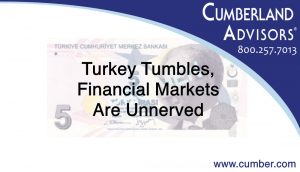The Turkish lira is down more than 40% year to date, with Friday’s fall alone reaching 18.5% at one point and ending down 14.3% for the day. While Turkey’s economy is not large, some major European banks have big exposures in non-lira loans.

The European Central Bank is reported to be concerned about the vulnerability of such banks, in particular, BBVA, Unicredit and BNP. Investors do not believe that the Turkish government under the strong-arm rule of President Erdogan is likely to take the actions needed to avoid a hard landing for the Turkish economy.
The unprecedented dispute between the Turkish and United States presidents, despite their being NATO allies, about the detention of a pastor from North Carolina has rattled markets in recent days. There are other elements in the dispute, including other Americans being held hostage and Turkish anger at American support for Kurdish rebels in Syria. Trump’s use of sanctions and tariffs risks hardening Turkey’s position.
The economic problems facing Turkey, however, are of a longer-term nature, evidenced by the dramatic fall in the lira over the past five years. The economy under Erdogan’s rule has binged on low-cost short-term foreign currency debt and is seriously out of balance. The country’s heavy consumption and construction orientation needs to be moderated. Up to the June election investors had been comforted by the technocratic managers of Turkey’s economy who were seen as a check on Erdogan’s lack of knowledge of economics. After the election, Erdogan appointed his son-in-law in charge of the finance ministry and increased the power of that ministry. Investor confidence understandably declined. Turkey’s nonfinancial institutions will have to pay or roll over some $66 billion in foreign currency debt during the next 12 months. Turkish banks will have to do the same for $76 billion, a formidable challenge.
The government announced a “new economic plan” Friday, but so far there have been few details released. Erdogan vowed to fight an “economic war” and asked Turkish citizens to sell dollar and other assets and buy lira to support the currency. We do not expect many will heed that call. Engaging in a tariff and sanctions battle with the US surely is not a solution. Turkey could raise interest rates, which are far too low in view of Turkey’s high rate of inflation, but Erdogan is adamantly against this move, arguing that high interest rates increase inflation. Turkey could go to the IMF and seek support. But asking for help would be counter to Erdogan’s pride, and more importantly the IMF would demand that Turkey agree to tight fiscal and monetary policies, just the policy moves Erdogan has been strongly opposing. Erdogan has ruled out this option. There are rumors that capital controls are being considered, but such a move would likely only cut off foreign lending to and investing in the country. The option that seems most likely is for the government to hope that its new economic policies, which may include some modest monetary and fiscal tightening, in conjunction with the slower economic growth that now is expected, will be sufficient and that the storm will pass. We fear a more negative outcome, a hard landing that eventually drives the country to the IMF.
Financial markets are concerned, rightly in our view, about the risks of contagion from this situation. Bank stocks in Europe are being hit, and this has led to losses in broad European market indexes. The iShares MSCI Eurozone ETF, EZU, lost 2.87% Friday and the iShares MSCI Germany ETF, EWG, dropped 3.03%. The iShares MSCI Turkey ETF, TUR, tumbled 15.53% on Friday and is down over 50% year to date. Fortunately, we do not hold the Turkey market ETF in our International and Global ETF portfolios.
Emerging markets around the globe have also been hit. The Vanguard FTSE Emerging Markets ETF, VWO, declined 1.99% Friday with some individual markets such as Mexico and Brazil declining more than 3%. The European banks that have heavy exposure to Turkey have also lent heavily to other emerging markets. Emerging markets can be hit severely when investors retreat from risky assets. Should the decline in emerging markets become substantial, even markets with good prospects can suffer as investors sell profitable investments to cover their losses. As Turkey’s crisis and its negative effects on emerging markets are not likely to be resolved quickly, we have reduced the weight of emerging markets in our International and Global ETF portfolios and increased cash positions.
Late Sunday, Turkey’s central bank reduced reserve requirements and modified banks’ liquidity management rules. Treasury and Finance Minister Albayrak ruled out exchange controls. There was no mention of raising interest rates. The lira declined further in early trading.
Bill Witherell, Ph.D.
Chief Global Economist & Portfolio Manager
Email | Bio
_____________________________________________________________________
Sources: Financial Times, BBH.com, The Economist, CNBC.com, Bloomberg.com
Links to other websites or electronic media controlled or offered by Third-Parties (non-affiliates of Cumberland Advisors) are provided only as a reference and courtesy to our users. Cumberland Advisors has no control over such websites, does not recommend or endorse any opinions, ideas, products, information, or content of such sites, and makes no warranties as to the accuracy, completeness, reliability or suitability of their content. Cumberland Advisors hereby disclaims liability for any information, materials, products or services posted or offered at any of the Third-Party websites. The Third-Party may have a privacy and/or security policy different from that of Cumberland Advisors. Therefore, please refer to the specific privacy and security policies of the Third-Party when accessing their websites.
Sign up for our FREE Cumberland Market Commentaries
Cumberland Advisors Market Commentaries offer insights and analysis on upcoming, important economic issues that potentially impact global financial markets. Our team shares their thinking on global economic developments, market news and other factors that often influence investment opportunities and strategies.

